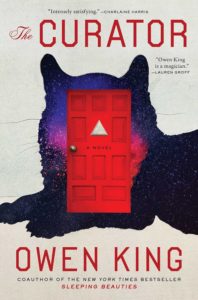 A book has been sitting on my nightstand instead of my to-read shelf, for somewhere between one and a half to two years. Long enough that the top part of the pages are yellowed from the sunlight through the window behind my nightstand. I got it from someone for my birthday or Christmas, and I honestly don’t know who or why. Did I put it on a wishlist? I cannot rule this out, but I don’t know why I would have. And yet I cannot think of another reason it would have appeared, and nobody has asked me about it in the meantime.
A book has been sitting on my nightstand instead of my to-read shelf, for somewhere between one and a half to two years. Long enough that the top part of the pages are yellowed from the sunlight through the window behind my nightstand. I got it from someone for my birthday or Christmas, and I honestly don’t know who or why. Did I put it on a wishlist? I cannot rule this out, but I don’t know why I would have. And yet I cannot think of another reason it would have appeared, and nobody has asked me about it in the meantime.
But appear, it did.
The Curator, by Owen King[1], tells the story of a fictionalized probably European, probably 19th Century independent city[2] in the throes of revolution. See, the rich but liberal students at the University, after an inciting event, have taken it into their heads to free the extremely poor people in “the Lees” from their oppressors among the nobility, and the attempt is astonishingly successful, except… now what?
In the midst of these happenings, a maid lately employed by the university named Dora finds an opportunity to look into her older brother’s mysterious final moments, from when he died during her childhood, by becoming the owner of the newly vacated Society for Psykical Research, in which he had spent some time before that death and the complete failure of her family’s fortunes. Alas for her plans, it has burned completely to the ground, one odd doorframe in the middle notwithstanding, and so she becomes the Curator of the National Museum of the Worker next door, instead.
The remainder of the book, in a meandering style that the jacket copy accurately yet somehow non-pejoratively calls Dickensian, explores her new museum, and a city and its inhabitants in rudderless transition, and the mostly poor folk religion surrounding the many, many cats in the city, and the strange disappearances that are beginning to mount up, and the Morgue Ship that used to reside in the harbor as a penny dreadful curiosity until it got swept up in the inciting event I mentioned earlier, whereupon it disappeared, except rumor has it all those disappeared people are being abducted onto the ship as a part of their disappearance. Which is ridiculous, of course.
By way of recommendation, I must say that it’s been a while since I’ve been so invested in the fate of a new-to-me character, and almost all of the characters had something endearing to offer. I’m somewhat surprised I haven’t seen more noise around this one.
[1] of the Maine Kings. You might know him from his collaboration on Sleeping Beauties.
[2] Or I suppose it’s the capital of a fictionalized country? On the one hand, it never seems like more than a city and surrounding estates, but on the other, it has a king. Those kinds of details hover in the no-man’s land between sparse and irrelevant.
